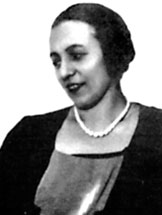The Gurdjieff Legacy Foundation Archives
Jeanne de Salzmann (1889–1990)

Jeanne Matignon de Salzmann, born Jeanne Allemand in 1889 in Reims, France, was raised in Geneva, Switzerland.1 She studied piano, composition, and orchestral conducting at the Conservatory of Geneva. A pupil of Emile-Jaques Dalcroze, she was a dancer and teacher of rhythmic movements at his Eurhythmics Institute in Hellerau, Germany. There she met the painter Alexander de Salzmann. They married in 1911 and later moved to Tiflis, Georgia, where she opened a school of dance and music. In 1919, while living in Tiflis, the composer Thomas de Hartmann introduced the young couple to G. I. Gurdjieff. Mme de Salzmann was a lifelong pupil, and near the end of Gurdjieff's life she assisted him at meetings until his death in October 1949.2 Mme de Salzmann died at the age of 101 in Paris in May 1990.3 A book of her writings, The Reality of Being, was published in 2010.
Before he died, Gurdjieff told Mme de Salzmann: "Publish as and when you are sure that the time has come. Publish the First and Second Series... the first thing is to prepare a nucleus of people capable of responding to the demand which will arise." And furthermore, "To publish the Third Series is not necessary.... It was written for another purpose."4 After Gurdjieff's death she said, "When a teacher like Mr. Gurdjieff goes, he cannot be replaced. Those who remain cannot create the same conditions. We have only one hope: to make something together. What no one of us could do, perhaps a group can. Let us make this our chief aim in the future."5 During the next 41 years she arranged for the publication of his books and helped to establish Gurdjieff centers in Paris, New York, London and Caracas, Venezuela. She also filmed the Movements, preserving them as they were taught by Gurdjieff. Later, in 1957, she initiated a revision of the First Series. As Jean Vaysse said, "It was Jeanne de Salzmann's achievement to preserve and transmit, in all their original authenticity, not only the written part, but also the oral and practical parts, of the teaching given by Gurdjieff, which without her would surely have been lost. We owe her for everything that has reached us."6
Mme de Salzmann also worked directly with students both before and after Gurdjieff's death. When some students were too in awe of Gurdjieff to speak with him they would go to Mme de Salzmann.7 The director Peter Brook, with whom she had worked on the film Meetings with Remarkable Men (1979), said: "Her speaking was not for herself, she was never carried away by her own memories or her ideas; out of an awareness of what was needed, out of listening to the other person's state, she would speak directly to the person so as to evoke a meaning or encourage an action to arise... She was always present...." And "Wherever she went, she seemed always in the same place, her stability unaffected by outer change."8
Under the topic "A new thinking" in The Reality of Being Mme de Salzmann said, "I need to see that the thought "I" is the greatest obstacle to consciousness of myself."9 Speaking of the First Initiation that a seeker experiences, she said, "You will see that in life you receive exactly what you give. Your life is the mirror of what you are."10 Another time Mme de Salzmann voiced, "Yes, your appreciation of yourself blinds you. It is the biggest obstacle to a new life."11 Regarding the topic of man being asleep, she said, "Man remains a mystery to himself. He has a nostalgia for Being, a longing for duration, for permanence, for absoluteness—a longing to be."12 Speaking about attention, she said, "I believe I need to pay attention when, in fact, I need to see and know my inattention." She voiced the following in regard to working: "Am I convinced of the uselessness of everything I believe I know?"13 and, "Feeling is the essential element of knowing."14
Notes
1. Jeanne de Salzmann. https://en.wikipedia.org/wiki/Jeanne_de_Salzmann
2. "Jeanne de Salzmann," Gurdjieff International Review, November 2003, http://www.gurdjieff.org/salzmann.htm
3. Jeanne de Salzmann, The Reality of Being (Boston: Shambala Publications, 2010), jacket copy.
4. William Patrick Patterson, Struggle of the Magicians: Exploring the Teacher-Student Relationship (Fairfax, CA: Arete Communications, 1998), 224–25.
5. J. G. Bennett, Witness (Santa Fe: Bennett Books, 2007), 228.
6. Jean Vaysse, Toward Awakening: An Approach to the Teaching Brought by Gurdjieff (Sandpoint, ID: Morning Light Press, 2009), 2.
7. Margaret Anderson, The Unknowable Gurdjieff (York Beach, ME: Samuel Weiser, 2007), 197–203.
8. Peter Brook, Threads of Time (Washington, DC: Counterpoint, 1998), 109.
9. Ibid., 58.
10. Jacob Needleman and George Baker, Gurdjieff: Essays and Reflections on the Man and His Teaching (New York: Continuum, 1996), 4.
11. Ibid., 4.
12. de Salzmann, Reality, 9.
13. Ibid., 8.
14. Ibid., 54.